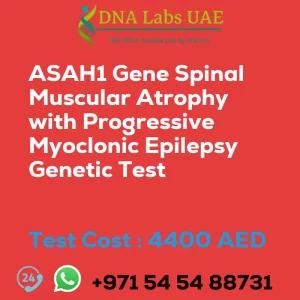TECPR2 Gene SPG49 Genetic Test
Cost: AED 4400.0
Symptoms, Diagnosis, and Test Details
The TECPR2 gene is associated with a rare genetic disorder called hereditary spastic paraplegia type 49 (SPG49). This disorder is characterized by progressive stiffness and weakness of the legs, leading to difficulty walking. It is caused by mutations in the TECPR2 gene, which is involved in the transport of proteins within cells.
NGS (Next-Generation Sequencing) genetic testing is a type of genetic testing that uses advanced sequencing technology to analyze multiple genes simultaneously. In the case of SPG49, NGS genetic testing can be used to identify mutations in the TECPR2 gene.
The purpose of the SPG49 NGS genetic test is to confirm a diagnosis of hereditary spastic paraplegia type 49 by identifying mutations in the TECPR2 gene. This test can help to determine the underlying cause of the symptoms and guide treatment decisions.
It is important to note that genetic testing for SPG49 is typically only ordered for individuals who have symptoms consistent with hereditary spastic paraplegia and a suspected genetic cause. The test may not be necessary or appropriate for individuals without symptoms or a family history of the condition.
Test Components and Price
- Test Name: TECPR2 Gene SPG49 Genetic Test
- Components: Blood or Extracted DNA or One drop Blood on FTA Card
- Price: AED 4400.0
Sample Condition and Report Delivery
- Sample Condition: Blood or Extracted DNA or One drop Blood on FTA Card
- Report Delivery: 3 to 4 Weeks
Method and Test Type
- Method: NGS Technology
- Test Type: Neurological Disorders
Referring Doctor and Test Department
- Doctor: Neurologist
- Test Department: Genetics
Pre Test Information
Clinical History of Patient who is going for TECPR2 Gene SPG49 NGS Genetic DNA Test
A Genetic Counselling session to draw a pedigree chart of family members affected with TECPR2 Gene SPG49
Consult a Healthcare Professional or Genetic Counselor
If you have concerns about hereditary spastic paraplegia type 49 or believe you may be at risk, it is recommended to consult with a healthcare professional or a genetic counselor who can provide more information and guidance regarding genetic testing options.
| Test Name | TECPR2 Gene SPG49 Genetic Test |
|---|---|
| Components | |
| Price | 4400.0 AED |
| Sample Condition | Blood or Extracted DNA or One drop Blood on FTA Card o |
| Report Delivery | 3 to 4 Weeks |
| Method | NGS Technology |
| Test type | Neurological Disorders |
| Doctor | Neurologist |
| Test Department: | Genetics |
| Pre Test Information | Clinical History of Patient who is going for TECPR2 Gene SPG49 NGS Genetic DNA Test A Genetic Counselling session to draw a pedigree chart of family members affected with TECPR2 Gene SPG49 |
| Test Details |
The TECPR2 gene is associated with a rare genetic disorder called hereditary spastic paraplegia type 49 (SPG49). This disorder is characterized by progressive stiffness and weakness of the legs, leading to difficulty walking. It is caused by mutations in the TECPR2 gene, which is involved in the transport of proteins within cells. NGS (Next-Generation Sequencing) genetic testing is a type of genetic testing that uses advanced sequencing technology to analyze multiple genes simultaneously. In the case of SPG49, NGS genetic testing can be used to identify mutations in the TECPR2 gene. The purpose of the SPG49 NGS genetic test is to confirm a diagnosis of hereditary spastic paraplegia type 49 by identifying mutations in the TECPR2 gene. This test can help to determine the underlying cause of the symptoms and guide treatment decisions. It is important to note that genetic testing for SPG49 is typically only ordered for individuals who have symptoms consistent with hereditary spastic paraplegia and a suspected genetic cause. The test may not be necessary or appropriate for individuals without symptoms or a family history of the condition. If you have concerns about hereditary spastic paraplegia type 49 or believe you may be at risk, it is recommended to consult with a healthcare professional or a genetic counselor who can provide more information and guidance regarding genetic testing options. |








